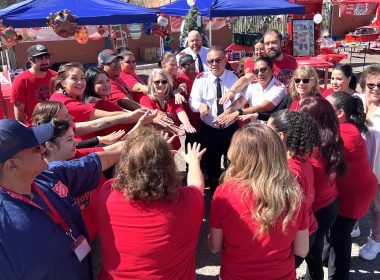An excerpt from “The Connected Leader: 7 Strategies to Empower Your True Self and Inspire Others.”
Let me start with a story about how not to listen. When our son Matthew was eight, I traveled to London on business, accompanied by him and my husband. The plan: they would play while I worked.
Before I showed up at my client’s corporate headquarters, I blew it with my son in the hotel room. He had only slept two hours on the flight across the Atlantic; he was sleep-deprived, jetlagged, out of his routine and crabby. He was not the only one.
Instead of listening to his cues and words, I focused on talking, giving instructions and lecturing. Instead of being with him and tuning in to his needs, I focused on doing—settling in, deciding on a place to eat, making sure I felt in charge—and talking to deal with my overwhelm and anxiety (a deeply entrenched pattern of mine). The more I tuned out and focused on my agenda, the more irritated he became. The more I talked at him in a demanding tone, the more upset he became. The more upset he became, the more controlling I became. We were a hot mess. It was on me.
Later that evening, I realized I had missed a royal opportunity to listen deeply. I had squandered a chance to just be with my son, extend compassion, and give him space to emotionally calm and physically rest. And I blew it because I did not hit my own pause button: In hindsight, I should have taken a few moments to practice mindfulness instead of focusing on unpacking and organizing and all the busyness that kept me in a highly alert state. If I had found a way to quiet my own inner noise, I would have been more able to breathe through the transition of time zone changes and dealing with the pre-day jitters that come before any major client engagement.
I teach this stuff! Yet, in that moment of hot-messiness, stillness evaded me. How different our relationship would have been that evening if I had shared what I was feeling, observing in him and communicated my hopes for our evening and time in London. The emotionally healthy, empathetic mom would have said, “I know you are really tired (so am I), and you have done a great job traveling. I also feel a bit overwhelmed, and I have a big day tomorrow. Why don’t you take a bath, and I’ll fix us some tea? Then we can relax and, as a family, settle in and enjoy being together.”
Instead, the exhausted, emotionally insensitive, anxious mom found ways to disconnect, blame, and stir up the irritation even more.
How many times do we do this with those who are most important to us? To those with whom we work closely nearly every day? Probably more often than we are even aware. What would happen if more people in our workplaces and in our homes practiced silence every day? What would happen if, before each team meeting, everyone took a few deep breaths to prepare and focus, put their phones down, and did a quick mindfulness meditation? If each person had a practice of silence that would allow them to listen to their own thoughts and feelings uninterrupted, and as a result of this practice, were more apt to listen to others? To let others truly talk instead of jumping in as they take a breath? If we were less concerned with who was right and more focused on understanding and connecting? If we could show up like a steadfast oak tree, grounded and welcoming? But how do you do that?
Several practices encourage this kind of deep listening. Each are lifelong endeavors that help move us forward into a deeper rhythm with ourselves and others, whether it be at work or at home:
• Stillness. First and foremost, to be a world-class leader who listens to themselves and others, a daily practice of solitude and stillness is required. There is no shortcut. This practice grounds you, and that grounding will inspire others to cultivate their own practice of silence. If the hardest and most enriching work I do is on myself, then it stands to reason that to be a more effective leader, I benefit from being a more effective “me.” Practicing stillness and mindfulness helps immensely.
• Self-discovery. We begin to know and accept ourselves more fully as a result of solitude, stillness and mindfulness. To leverage our self-awareness and regulate our emotions in productive ways, we must identify what we are feeling. To learn what beliefs, attitudes, stinkin’ thinkin’, and woundedness lie underneath the surface emotion, and come to the table of emotional connectedness with an attitude of curiosity (“What else can I learn about myself?”) and self-compassion (“How do I balance self-acceptance while gently nudging myself toward
growth?”). What those of us in the leadership space know is that nothing (no degree, no title, no Learjet, no byline) trumps the power of self-discovery when it comes to sustainable professional and personal success.
• Other-awareness. Just as essential as self-discovery is the ability to tune in to others with empathy while simultaneously honoring yourself. This is the delicate balance of respecting the “I” while honoring the “you” and appreciating the “we.” Sounds poetic and appealing. It is difficult and scary. Since we cannot do for others what we cannot do for ourselves, we benefit by developing a healthy relationship with ourselves: accepting who we are, being aware of our feelings, understanding our unhealthy thinking patterns that keep us stuck, and exhibiting rigorous self-honesty and accountability. It requires a quiet confidence, emotional regulation, an understanding of our limits and boundaries, and emotionally intelligent ways of communicating. Being tuned in to others essentially means you interact in a way so that others feel understood and respected even during times of conflict and differences; you can feel and accept their feelings because you are in tune with yours.
Taken from “The Connected Leader: 7 Strategies to Empower Your True Self and Inspire Others” (Post Hill Press, 2021) by Karen Hardwick. Used with permission.
Do Good:
-
- Read “The Connected Leader: 7 Strategies to Empower Your True Self and Inspire Others” (Post Hill Press, 2021) by Karen Hardwick.
- Get on the list for Good Words from the Good Word and get a boost of inspiration in 1 minute a day with a daily affirmation from Scripture list this sent straight to your inbox. It’s an email to help you start your day with goodness.
- Hear this: Your story is uniquely yours. It’s the one thing you have that no one else does. And you’re the one who can tell it best. Take our free email course on how to find your voice, own your story and share it with others.
- Need some extra motivation to do good today? Follow Caring Magazine on Instagram for inspiring stories, podcasts and more to get you in the Fight for Good.













